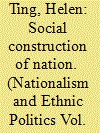| Srl | Item |
| 1 |
ID:
084381


|
|
|
|
|
| Publication |
2008.
|
| Summary/Abstract |
A change in the basis of political conflict has occurred in the West from a political arena dominated by issues of social class and religiosity to one dominated by issues of identity with either the nation-state or a subculture reflected in the declining vote share of mainstream parties of interests and the emergence of parties of identity. These new parties have been identified as "radical right" but they are distinct from parties of the classic right. We develop a causal model using World Values data (1990 and 1999 waves) from Austria, a country with a national identity party, and Belgium, a country with a party of subcultural defense, to show the attributes of supporters for the emerging parties of identity are the same at the national or subcultural levels and are distinct from those predicting support for the classic right.
|
|
|
|
|
|
|
|
|
|
|
|
|
|
|
|
| 2 |
ID:
084375


|
|
|
|
|
| Publication |
2008.
|
| Summary/Abstract |
Secessionism and regionalism are two alternative strategies for territorial minorities. While secessionists emphasize the right to self-determination, regionalists stress limited autonomy within an indivisible state. If voters are rational, secessionist parties will be stronger in regions that could benefit economically and politically from independence, and regionalist parties will be stronger in regions that would benefit from cultural autonomy but not independence. Statistical tests confirm that regionalist-voting territories differ systematically from secessionist-voting territories, and that regionalism can be a reaction against secessionist mobilization elsewhere.
|
|
|
|
|
|
|
|
|
|
|
|
|
|
|
|
| 3 |
ID:
084380


|
|
|
|
|
| Publication |
2008.
|
| Summary/Abstract |
The timing of the rise of and spatial variation in popular support for Jurassian nationalism cannot be explained by existing theories of nationalism or proposed explanations of the Jurassian case. The article argues that support for Jurassian nationalism has its roots in Catholic political traditions of antagonism toward Berne and develops an explanation grounded in a theory of discursive change. The timing of Jurassian nationalism can be explained by the decline of the salience of the religious axis of conflict in Jurassian politics, and the variation in support for nationalism can be explained by the existence within Catholic communities of discursive content that, upon the decline of religious conflict, was susceptible to reinterpretation within a nationalist frame.
|
|
|
|
|
|
|
|
|
|
|
|
|
|
|
|
| 4 |
ID:
084383


|
|
|
|
|
| Publication |
2008.
|
| Summary/Abstract |
In this article, the term "nation" is understood as a mental construct, and the formation of national identity as a dynamic, contentious historical process of social construction. Using the concept of "figured world of nationhood," I discuss how the subjective, collective perception of the "objective," virtual reality of a nation is (re)constituted and negotiated through social practices. In the same process, actors come to increasingly identify with and commit themselves to this "figured world of nationhood." The agency of social actors involved is differentiated according to the respective "social field" of their action.
|
|
|
|
|
|
|
|
|
|
|
|
|
|
|
|
| 5 |
ID:
084378


|
|
|
|
|
| Publication |
2008.
|
| Summary/Abstract |
This article examines the early phase of Russian Zionism in the context of the Russian Empire, which was neither a nation-state nor a frontier of Western modernity, and suggests that we can understand what is termed as "ethnic nationalism" only within its own context, including the "imagined" context of its emissaries. Russian Zionism paradoxically started as an attempt to reintegrate Jews into the Empire; thus, it derived its meaning from the assumption of the multinational social order of the Empire. Western Zionism, which emerged in another context, attempted to co-opt Russian Zionism when the latter highlighted the strength of its ethnicity as compared to Western Jew in order to counter the former's modernistic scheme.
|
|
|
|
|
|
|
|
|
|
|
|
|
|
|
|